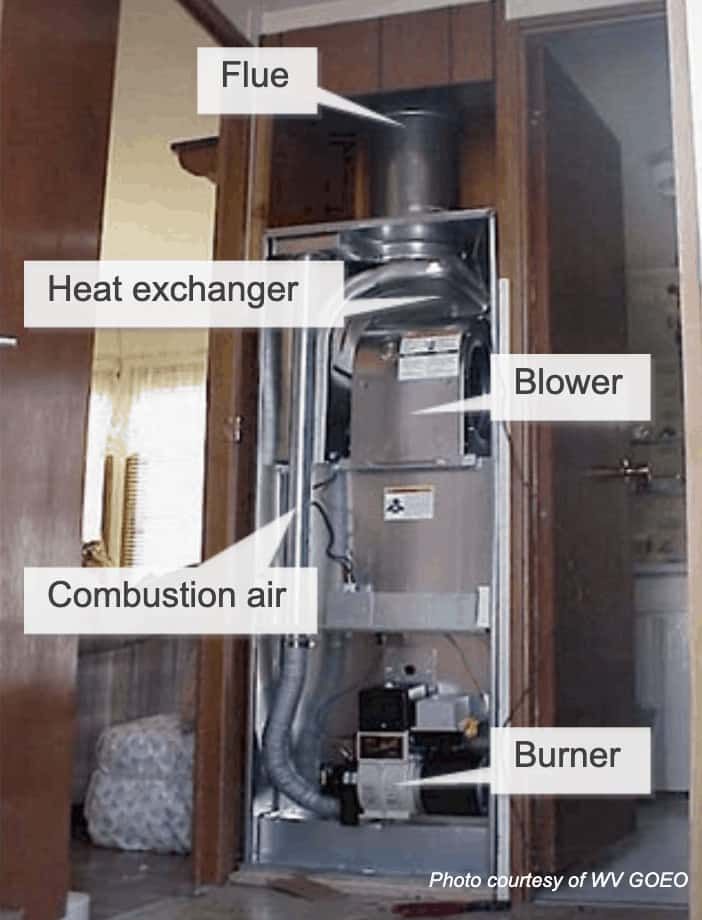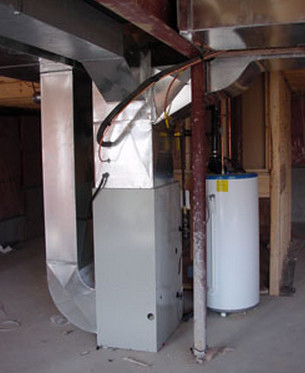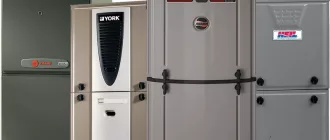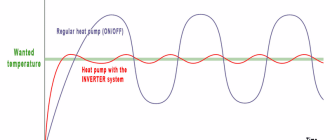
Rural Home? Compare Electric, Propane and Oil Furnaces
Are you living in a rural area and looking for the perfect heating solution for your home? Look no further! We offer a wide range of electric, propane, and oil furnaces to suit your needs. Compare the options below and find the one that fits your requirements:
Electric Furnaces
Efficient and reliable: Electric furnaces are a popular choice for rural homes. They provide consistent heat and require minimal maintenance. With their high energy efficiency, you can enjoy lower utility bills without compromising on comfort.
Propane Furnaces
Powerful and versatile: Propane furnaces are known for their strong heating capabilities, making them ideal for colder climates. They can produce high temperatures quickly and efficiently, ensuring your home stays warm even during the coldest winter nights in rural areas.
Oil Furnaces
Durable and long-lasting: Oil furnaces are built to withstand tough conditions, making them perfect for rural homes. With proper maintenance, they can last for many years, providing reliable and consistent heat. Additionally, oil furnaces are known for their quiet operation, ensuring a peaceful environment for your rural home.
No matter which type of furnace you choose, our team of experts is here to help you make the best decision for your rural home. Contact us today to get started!
Overview of Furnace Options
When it comes to heating your rural home, you have several furnace options to choose from. Here, we will compare the benefits of electric, propane, and oil furnaces to help you make an informed decision.
| Electric Furnaces |
|
| Propane Furnaces |
|
| Oil Furnaces |
|
By comparing these furnace options, you can determine which one best suits your rural home’s needs. Whether you prioritize cost-effectiveness, ease of maintenance, or heat output, there is a furnace type that will meet your requirements. Make an informed choice and enjoy a warm and comfortable home all winter long.
Factors to Consider
When comparing electric, oil, and propane furnaces for your rural home, there are several factors to consider:
- Cost: Electric furnaces are typically more expensive to install compared to oil and propane furnaces. However, they tend to have lower operating costs in the long run. Oil furnaces have lower upfront costs but higher operating costs due to fluctuating oil prices. Propane furnaces have moderate upfront costs and can be more cost-effective if propane is readily available in your area.
- Efficiency: Electric furnaces are highly efficient, converting nearly 100% of the energy into heat. Oil and propane furnaces have lower efficiency ratings, typically around 80-95%. However, the efficiency of oil and propane furnaces can be improved with regular maintenance and upgrades.
- Availability: Electric furnaces are widely available and can be installed in almost any location. Oil and propane furnaces require fuel storage and delivery, which may be less convenient in rural areas.
- Environmental Impact: Electric furnaces produce zero emissions on-site, making them the cleanest option. Oil and propane furnaces release carbon dioxide and other pollutants during combustion, contributing to air pollution and climate change. However, oil and propane furnaces have made significant advances in reducing their environmental impact in recent years.
- Heating Capacity: Electric furnaces may have limitations on their heating capacity, especially in extremely cold climates. Oil and propane furnaces can provide higher heat output and are better-suited for heating larger homes in colder regions.
- Maintenance: Electric furnaces require minimal maintenance compared to oil and propane furnaces, which require regular check-ups, filter replacements, and fuel storage maintenance.
Considering these factors will help you make an informed decision when comparing electric, oil, and propane furnaces for your rural home. Remember to consult with a heating professional to determine which option is best suited for your specific needs.
Efficiency Ratings
When it comes to furnaces, efficiency is an important factor to consider for your rural home. Efficient furnaces can help you save money on your energy bills while also reducing your environmental impact. Here are some efficiency ratings to compare when choosing between propane, electric, and oil furnaces:
- AFUE (Annual Fuel Utilization Efficiency) – This rating measures how efficiently a furnace converts fuel into heat over the course of a year. The higher the AFUE rating, the more efficient the furnace. Propane furnaces typically have a higher AFUE rating compared to electric and oil furnaces.
- HSPF (Heating Seasonal Performance Factor) – This rating is specifically for heat pumps, which can provide both heating and cooling. It measures the efficiency of the heating function of a heat pump. The higher the HSPF rating, the more efficient the heat pump.
- SEER (Seasonal Energy Efficiency Ratio) – This rating is also specific to heat pumps and measures the efficiency of the cooling function. The higher the SEER rating, the more efficient the heat pump is at cooling.
- ENERGY STAR® Certification – Look for furnaces that are ENERGY STAR certified. This certification indicates that the furnace meets strict efficiency guidelines set by the U.S. Environmental Protection Agency. ENERGY STAR certified furnaces are more efficient and can help you save even more on your energy bills.
Comparing these efficiency ratings can help you make an informed decision when choosing between propane, electric, and oil furnaces for your rural home. Consider your heating needs, budget, and environmental priorities to find the furnace that best suits your requirements.
Electric Furnaces
Electric furnaces are a popular choice for heating homes. They use electricity as their power source to generate heat. If you’re considering an electric furnace for your rural home, here are some key factors to consider:
- Efficiency: Electric furnaces are known for their high efficiency. They can convert almost all the energy they consume into heat, making them cost-effective and energy-efficient.
- Cost: While electric furnaces may have a higher upfront cost compared to other options like propane or oil furnaces, their lower maintenance and operating costs can save you money in the long run.
- No fuel storage: One advantage of electric furnaces is that they don’t require fuel storage. You won’t need to worry about propane or oil tanks and the associated delivery costs.
- Clean operation: Electric furnaces produce zero emissions at the point of use. This makes them an environmentally friendly heating option for your home.
- Quiet operation: Electric furnaces are typically quieter compared to other types of heating systems, such as oil or propane furnaces.
Before making a decision, it’s important to compare electric furnaces with other options, such as propane and oil furnaces, to determine the best heating solution for your rural home.
Pros of Electric Furnaces
An electric furnace is a popular choice for rural homes that do not have access to natural gas or propane. Here are some of the advantages of using an electric furnace:
1. Easy Installation: Installing an electric furnace is relatively straightforward and can be done by a qualified technician. This makes it a convenient option for homeowners who want a hassle-free heating solution.
2. Energy Efficiency: Electric furnaces are known for their high energy efficiency. They convert almost all the electricity they use into heat, making them a cost-effective choice for heating your home.
3. Lower Maintenance: Electric furnaces require less maintenance compared to oil furnaces. They do not have a combustion system, which means there are no oil filters or burners to regularly clean or replace.
4. Safety: Electric furnaces are considered safer than oil furnaces because they do not produce any harmful emissions, such as carbon monoxide. This makes them a reliable and environmentally-friendly option for heating your home.
5. Quiet Operation: Electric furnaces operate quietly, providing a peaceful and comfortable environment in your rural home.
In conclusion, when comparing electric, propane, and oil furnaces for your rural home, consider the pros of electric furnaces such as easy installation, energy efficiency, lower maintenance, safety, and quiet operation. All these factors make electric furnaces a great choice for rural homeowners.
Cons of Electric Furnaces
While electric furnaces have their advantages, there are also some drawbacks to consider, especially if you live in a rural area and have other options like oil or propane furnaces.
|
Higher Operating Costs |
|
Electric furnaces tend to have higher operating costs compared to oil or propane furnaces. This is because electricity is generally more expensive than oil or propane in many areas. If you rely solely on electricity for heating your rural home, you may experience higher monthly heating bills. |
|
Dependence on the Power Grid |
|
Unlike oil or propane furnaces which can operate independently, electric furnaces require a continuous supply of electricity. If there is a power outage in your area, you will lose heating until the power is restored. This can be an inconvenience and potentially result in discomfort during the colder months. |
|
Less Efficient in Extreme Cold |
|
Electric furnaces may not be as efficient as oil or propane furnaces in extremely cold temperatures. In rural areas where temperatures can drop significantly, electric furnaces may struggle to keep up and provide the desired level of warmth. This can lead to discomfort and the need for additional heating sources. |
|
Limited Heating Capacity |
|
Electric furnaces typically have a limited heating capacity compared to oil or propane furnaces. This means that they may take longer to heat up your home or struggle to provide sufficient warmth in larger or poorly insulated rural homes. It’s important to consider the heating needs and size of your home when choosing an electric furnace. |
Overall, while electric furnaces may be a suitable option for some homeowners, it’s important to weigh the pros and cons and consider your specific needs, especially in a rural setting where other heating options like oil or propane furnaces may offer more benefits. Consulting with a heating professional can help you make an informed decision.
Propane Furnaces
If you live in a rural area and are looking for a reliable and efficient heating solution, propane furnaces are an excellent choice. Propane furnaces are known for their high heating efficiency and cost-effectiveness. They offer a clean and efficient way to heat your home without the need for oil or electric furnaces.
When you compare propane furnaces to other options like oil or electric furnaces, you’ll find that propane furnaces provide a number of advantages. Propane furnaces are known for their fast and even heating, allowing you to quickly and easily warm up your entire home. They also offer a more consistent heat output compared to electric or oil furnaces, ensuring that you stay comfortable no matter what the weather is like outside.
Propane furnaces are also a great option for rural homes because propane is readily available, even in remote areas. You don’t have to worry about running out of fuel, as propane can be easily delivered to your home. Propane is also a clean-burning fuel, reducing your carbon footprint and ensuring a healthier environment for you and your family.
When it comes to maintenance, propane furnaces are relatively easy to maintain. They require less cleaning and maintenance compared to oil furnaces, saving you time and money. Propane furnaces also tend to have a longer lifespan compared to electric furnaces, providing you with years of reliable heating for your rural home.
So if you’re comparing furnaces for your rural home, don’t overlook the benefits of propane furnaces. With their high heating efficiency, cost-effectiveness, and availability, propane furnaces are an excellent choice for rural homeowners. Stay warm and cozy this winter with a propane furnace!
Pros of Propane Furnaces
When it comes to heating your rural home, propane furnaces offer several advantages over other options such as oil or electric furnaces. Here are some of the key benefits:
- Efficiency: Propane furnaces are known for their high efficiency, meaning they can effectively convert fuel into heat, saving you money on energy bills.
- Lower Cost: Propane is often more cost-effective compared to oil or electric alternatives. This is because propane is a readily available fuel source, and the prices tend to remain stable.
- Convenience: Propane furnaces require less maintenance compared to oil furnaces. They do not leave behind any residue or ash, which means fewer cleaning and servicing requirements.
- Shorter Heating Time: Propane furnaces heat up faster compared to oil furnaces. This means you can enjoy a comfortable temperature in your home sooner.
- Availability: Propane is widely available, even in rural areas. This makes it a reliable fuel source, ensuring you won’t have to worry about running out of heat during the colder months.
Considering these advantages, it’s clear that propane furnaces are a smart choice for heating your rural home. Take the time to compare electric, oil, and propane furnaces to make an informed decision that suits your needs and budget.
Cons of Propane Furnaces
While propane furnaces offer several benefits for rural homes, there are some drawbacks to consider:
1. Cost: Propane furnaces can be more expensive to install compared to electric or oil furnaces. The upfront cost includes purchasing the furnace itself, installing gas lines, and storage tanks.
2. Fuel Availability: Propane may not be readily available in all rural areas. Limited access to propane suppliers can result in higher fuel costs and inconvenience when it comes to refilling the tanks.
3. Efficiency: Propane furnaces are generally less efficient compared to electric or oil furnaces. This means that they may consume more fuel to produce the same amount of heat, resulting in higher operating costs.
4. Environmental Impact: Propane is a fossil fuel and burning it releases greenhouse gases into the atmosphere. If you are concerned about reducing your carbon footprint, you may want to consider alternative heating options.
5. Combustion Safety: Propane is highly flammable, and proper safety precautions must be taken when using propane furnaces. This includes regular maintenance, ensuring proper ventilation, and installing carbon monoxide detectors.
Before making a decision, it is important to carefully compare propane furnaces with other options, such as electric and oil furnaces, to determine the best choice for your rural home.
Oil Furnaces
When it comes to heating your rural home, oil furnaces are a reliable and efficient option to consider. They provide consistent and comfortable warmth, making them a popular choice for homeowners who want to keep their homes cozy during the cold winter months.
One of the benefits of oil furnaces is their high heating efficiency. They can reach efficiency levels of up to 95%, which means that most of the oil consumed is converted into heat for your home. This not only helps you save on energy costs but also reduces your carbon footprint.
Oil furnaces also offer a high heating capacity, making them suitable for larger homes or areas with extremely cold climates. They can provide a steady and reliable source of heat, even in the harshest winter conditions.
Another advantage of oil furnaces is their long lifespan. With proper maintenance, an oil furnace can last up to 30 years. This durability makes them a worthwhile investment for homeowners looking for a long-term heating solution.
However, it’s important to note that oil furnaces require regular maintenance, including annual cleanings and inspections. Additionally, you’ll need to have an oil storage tank on your property to store the fuel. While oil furnaces can be efficient and cost-effective, it’s essential to consider these factors before making a decision.
In conclusion, when comparing electric, propane, and oil furnaces for your rural home, oil furnaces offer a reliable, efficient, and long-lasting heating solution. Their high heating efficiency, capacity, and durability make them a popular choice among homeowners. Just remember to factor in the regular maintenance and fuel storage requirements when making your decision.
Pros of Oil Furnaces
When it comes to heating your rural home, oil furnaces offer several advantages. Here are some of the key benefits:
1. Efficiency: Oil furnaces are known for their high efficiency, ensuring that you get the most out of every gallon of oil you use. This can help you save on energy costs in the long run.
2. Reliability: Oil furnaces are known for their reliability, especially in areas where electrical outages are common. In rural areas, power interruptions are more likely to occur, making oil furnaces a dependable heating option.
3. Heat Output: Oil furnaces provide a high heat output, allowing them to quickly and effectively warm up your home. This is especially important in cold rural areas where temperatures can drop significantly.
4. Longevity: Oil furnaces are built to last, with a typical lifespan of 15 to 20 years when properly maintained. This makes them a durable and cost-effective heating option for your rural home.
5. Flexibility: Unlike electric furnaces, oil furnaces can be easily installed in remote areas where there may not be access to a reliable electricity supply. This makes them a practical choice for rural homeowners.
When comparing heating options for your rural home, it’s important to consider the pros of oil furnaces. They offer efficiency, reliability, high heat output, longevity, and flexibility, making them a suitable choice for heating your home in remote areas.
Cons of Oil Furnaces
While oil furnaces have been a popular choice for heating rural homes, there are some drawbacks to consider. Here are some of the cons of using oil furnaces:
1. Cost: Oil furnaces tend to be more expensive to install and maintain compared to electric and propane furnaces. The initial installation cost is higher, and ongoing maintenance and oil delivery can add to the overall expense.
2. Environmental Impact: Oil furnaces produce greenhouse gas emissions, contributing to air pollution and climate change. Burning oil releases carbon dioxide, sulfur dioxide, and nitrogen oxide, which are harmful to the environment and human health.
3. Fluctuating Oil Prices: The cost of oil can vary greatly depending on global oil prices. This can lead to unpredictable heating costs for homeowners with oil furnaces. Additionally, the availability and accessibility of oil can be limited in rural areas.
4. Storage and Odor: Oil furnaces require fuel storage tanks, which take up space and can be a potential fire hazard if not properly maintained. Additionally, oil can have a distinct odor that some homeowners may find unpleasant.
5. Carbon Footprint: Oil furnaces have a higher carbon footprint compared to electric and propane furnaces. The burning of oil contributes to the release of greenhouse gases, which contribute to climate change. Choosing an alternative energy source can help to reduce your home’s carbon footprint.
While oil furnaces have their disadvantages, it’s important to weigh them against the unique needs of your rural home. Consider factors such as the availability of fuel, the cost of installation and maintenance, and the environmental impact before making a decision.
Comparing Cost and Efficiency
When it comes to choosing the right furnace for your rural home, two important factors to consider are cost and efficiency. Comparing electric, propane, and oil furnaces can help you make an informed decision.
Electric furnaces are known for their relatively low installation and maintenance costs. They are also highly efficient, converting almost all of the electrical energy into heat. However, electricity rates can vary depending on your location, which may impact the long-term cost efficiency.
Propane furnaces, on the other hand, offer efficient heating at a lower cost than electric furnaces if propane prices are lower in your area. Propane is also a versatile fuel that can power other appliances in your home. However, propane furnaces require a storage tank and regular refills, which can add to the maintenance costs.
Oil furnaces are another option to consider. They provide reliable and efficient heat, especially in colder climates. However, oil furnace installation costs and maintenance expenses can be higher compared to electric and propane furnaces. Additionally, the price of oil can be volatile, which may impact the overall cost efficiency.
Ultimately, the best choice for your rural home depends on factors such as energy costs in your area, climate, and your specific heating needs. By comparing the cost and efficiency of electric, propane, and oil furnaces, you can find the option that suits your budget and keeps your home warm and comfortable.
Environmental Impact
When choosing a furnace for your rural home, it is important to consider the environmental impact of different fuel types. By comparing electric, propane, and oil furnaces, you can make an informed decision that minimizes your carbon footprint and supports sustainable living.
Electric Furnaces:
Electric furnaces are known for their efficiency and low environmental impact. They do not produce any direct emissions, as they do not burn fuel. This means that electric furnaces do not contribute to air pollution or greenhouse gas emissions. However, it is worth noting that some electric furnaces rely on coal-fired power plants for electricity, which can have a negative environmental impact if the power plant is not using clean energy sources.
Propane Furnaces:
Propane furnaces offer a reliable and efficient heating solution for rural homes. Propane is a clean-burning fuel that produces lower carbon emissions compared to oil furnaces. However, it is a fossil fuel and is derived from natural gas or crude oil. The extraction, production, and transportation of propane can have some environmental impact, including methane leakage and carbon emissions. It is essential to use propane from reputable suppliers who prioritize sustainability and minimize environmental harm.
Oil Furnaces:
Oil furnaces have been commonly used in rural areas for heating homes. However, they have a higher environmental impact compared to electric and propane furnaces. Oil combustion releases carbon dioxide, sulfur dioxide, and nitrogen oxides, contributing to air pollution and greenhouse gas emissions. The extraction, transportation, and refining of oil also have negative environmental consequences, including habitat destruction and the risk of oil spills.
By comparing the environmental impact of electric, propane, and oil furnaces, you can make a more eco-friendly choice for your rural home. Consider factors such as fuel source, carbon emissions, and sustainability practices when making your decision.
Choosing the Right Furnace for Your Rural Home
When it comes to heating your rural home, it’s important to choose the right furnace that meets your specific needs. There are three main types of furnaces commonly found in rural areas: oil, electric, and propane. Each type has its own advantages and considerations to take into account.
Oil furnaces are known for their reliability and efficiency. They use oil as fuel, which is readily available in rural areas. Oil furnaces provide consistent heat and can keep your home warm even during the coldest winter months. However, oil furnaces require regular maintenance and can be more expensive to operate compared to other options.
Electric furnaces are a popular choice for rural homes due to their affordability and ease of installation. They are generally smaller in size and don’t require a separate fuel source. Electric furnaces are also low-maintenance and don’t produce any emissions. However, they can be more expensive to operate compared to oil or propane furnaces, especially in areas with high electricity rates.
Propane furnaces are a versatile option for rural homes. They use propane gas as fuel, which is commonly available in remote areas. Propane furnaces are energy-efficient and provide consistent heat. They are also more affordable to operate compared to oil furnaces. However, propane furnaces require a propane tank to store the fuel, and the cost of propane can vary depending on location and demand.
When choosing the right furnace for your rural home, it’s important to consider factors such as fuel availability, maintenance requirements, operating costs, and efficiency. Comparing oil, electric, and propane furnaces can help you make an informed decision that fits your budget and heating needs. Remember to consult with a professional HVAC technician to determine the best option for your specific situation.
Installation and Maintenance
When it comes to the installation and maintenance of your home furnace, there are a few important factors to consider. Whether you choose an electric, oil, or propane furnace, proper installation and regular maintenance are key to keeping your furnace running smoothly and efficiently.
For electric furnaces, professional installation is typically recommended to ensure proper wiring and connections. Regular maintenance for electric furnaces usually involves checking and cleaning the electrical components, inspecting the heating elements, and replacing air filters as needed.
Oil furnaces require professional installation as well, as they involve the installation of an oil tank and fuel lines. Regular maintenance for oil furnaces includes cleaning the burner, checking the fuel system for leaks, and replacing the oil filter and nozzle.
Propane furnaces also require professional installation, as they involve the installation of a propane tank and gas lines. Regular maintenance for propane furnaces includes checking the gas connections, inspecting the burner and heat exchanger, and cleaning or replacing the air filter.
Whether you choose electric, oil, or propane, regular maintenance is essential to ensure the longevity and efficiency of your furnace. It is recommended to schedule annual maintenance with a qualified technician to address any potential issues and keep your home warm and comfortable throughout the year.
Q&A:
What are the advantages of an electric furnace?
An electric furnace has several advantages. First, it is energy efficient, as it converts almost 100% of the energy it uses into heat. Second, it is easy to install and maintain. Third, it is a clean source of heat, as it does not produce any fumes or emissions. Lastly, electric furnaces are typically quieter than other types of furnaces.
How does a propane furnace compare to an electric furnace?
Propane furnaces have some advantages over electric furnaces. Firstly, propane furnaces can provide heat even during power outages, as they do not rely on electricity. Secondly, propane is an affordable fuel source, making it a cost-effective option for heating your home. However, one disadvantage of a propane furnace is that it requires regular refills of propane, which can be an inconvenience.
What are the benefits of an oil furnace?
An oil furnace has its own set of advantages. Firstly, oil furnaces have a high heat output, which makes them particularly effective in colder climates. Secondly, oil is a relatively inexpensive fuel source, which can help save on heating costs. However, oil furnaces require a storage tank for the oil, and regular maintenance is necessary to ensure efficient operation.
Are electric furnaces more expensive to operate than propane or oil furnaces?
Electric furnaces tend to have higher operating costs compared to propane or oil furnaces. This is because electricity is generally more expensive than propane or oil. However, the overall cost of operating a furnace depends on various factors, such as the energy efficiency of the furnace and the current prices of electricity, propane, and oil in your area.
Which type of furnace is the most environmentally friendly?
Electric furnaces are considered the most environmentally friendly option among the three. This is because they do not produce any fumes or emissions during operation. Propane and oil furnaces, on the other hand, release carbon dioxide and other pollutants into the atmosphere. If reducing your carbon footprint is a priority, an electric furnace is the best choice.
Which type of furnace is the most cost-effective for a rural home?
It depends on a few factors, such as the local cost of electricity, propane, and oil. Generally, electric furnaces have lower upfront costs but higher operating expenses, while propane and oil furnaces have higher upfront costs but lower operating expenses. It would be best to calculate the total cost of ownership for each type of furnace based on your specific situation.
Are electric furnaces environmentally friendly?
Electric furnaces are considered more environmentally friendly compared to propane and oil furnaces. They produce zero emissions at the point of use, but the environmental impact depends on how electricity is generated in your area. If your electricity comes from renewable sources, such as wind or solar, using an electric furnace would be a greener choice.







